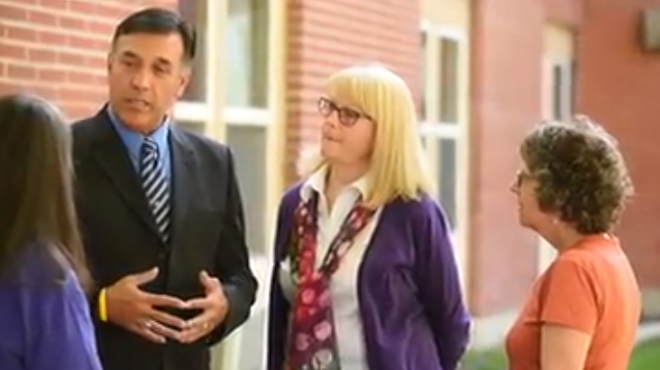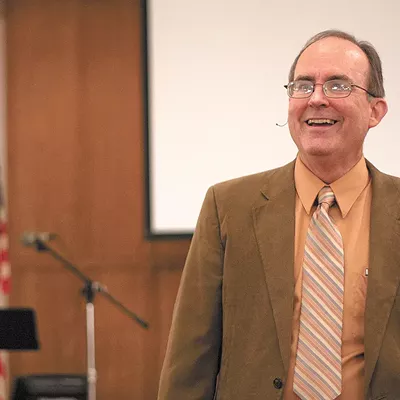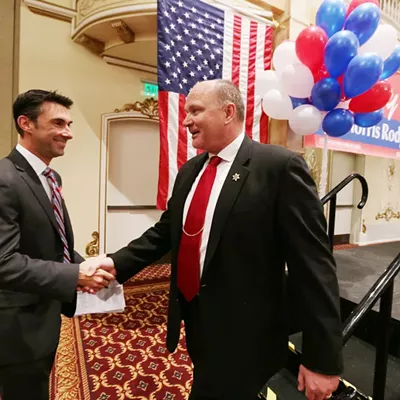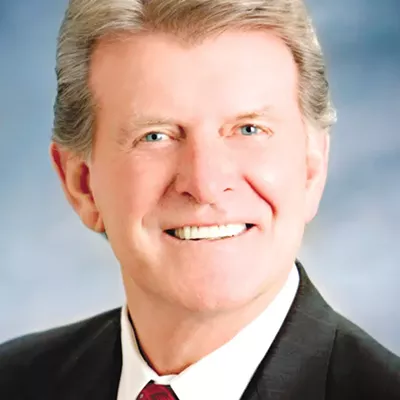At a town hall meeting in the downtown Spokane library on a recent Tuesday night, about half of the chairs in the room are filled. They're here to see Joe Pakootas, the Democratic challenger in the 5th congressional district race, standing in front flanked by campaign posters. They all have advice for the candidate ahead of his first debate in Walla Walla on Wednesday night.
Be careful when you talk about gun control. Emphasize your business background. Talk about agriculture.
An Oneida Indian in the audience congratulates Pakootas "for your strength and courage. For not shielding behind your Indianness." In the back of the room, a middle-aged man in a newsboy cap and a Pakootas sticker on his sweater raises his hand.
"We as a community have been supporting various candidates against Cathy McMorris Rodgers. We're so tired of her, we're beyond words," he says. "What is the strategy for between now and when the ballots come out — where you think you're going to catch everyone off guard and she's going to do a double take? ...What are we going to do?"
How do you win? That's the million-dollar question for the Pakootas campaign — if only they had that kind of money.
"I'm very confident we can actually beat her," Pakootas says at his office in the Spokane County Democrats headquarters on Main Avenue. "We're out there in the district and generating a lot more support."
With the general election less than four weeks away, Pakootas boasts more than 200 volunteers, including a bevy of enthusiastic phone-bankers and doorbellers, and a ground game for reaching out to independent and swing voters in Spokane. But he faces the power of incumbency and big money: He's been vastly outraised by his opponent, Rep. Cathy McMorris Rodgers, 12 to 1. Even his supporters quietly admit Pakootas has a "very steep, uphill climb" to come out on top in November.
"It's pretty clear who's going to win," says Travis Ridout, a political science professor at Washington State University, referring to the incumbent, McMorris Rodgers. The fourth-ranking Republican in the House of Representatives, she's handily won her past five electoral bids, carrying roughly 60 percent or more of the vote at the polls. The last time voters in the 5th ousted an incumbent was 20 years ago, when they replaced former Democratic Speaker of the House Tom Foley with Republican newcomer George Nethercutt.
"For one, it's just not a Democratic year," Ridout says. People tend to vote against the president's party in the midterms. "Second, Pakootas is an underfunded candidate. He doesn't have enough money to run the ads he'd need to run to get the name recognition to potentially defeat Cathy McMorris Rodgers."
McMorris Rodgers came under the national spotlight in January when she gave the Republican rebuttal to President Obama's 2014 State of the Union Address. A staunch opponent of the Affordable Care Act, she's known for her deeply conservative views and close alliance with House Speaker John Boehner and party leadership.
Add all that to one fact: Incumbents are notoriously difficult to unseat. Americans hate their do-nothing Congress, but they dislike their own representatives a lot less. In 2012, 90 percent of House members won re-election at a time when Gallup measured Congress' approval rating at 21 percent. Incumbents like McMorris Rodgers enjoy huge cash advantages over their challengers. McMorris Rodgers raised $1.8 million this election cycle, nearly half of which has come from political action committees. Meanwhile, the Pakootas campaign has reported raising less than $150,000. That money has paid for five billboards in Spokane, but it hasn't been enough for TV or radio ads — the two biggest items on his campaign's wish list.
"In a district that's so lopsidedly Republican, it makes it even more difficult for a challenger to prevail," Ridout says. "The best chance for change is if McMorris Rodgers decides to run for Senate or decides to retire."
Before a private audience at a Latah Creek fundraiser on Sunday, Pakootas is at ease talking about cuts to the food stamps program, the Paul Ryan budget, and tax breaks for big corporations, and his support for the Affordable Care Act. "We've got a lot work ahead of us regardless of whether I get elected or not," he says. The guests nod their heads in unison.
Part of his pitch is his own story. Pakootas, 57, is the longest-serving CEO of the Colville Tribal Federal Corporation, credited with turning the corporation into a profitable enterprise and mounting a landmark lawsuit against Teck Cominco, a Canadian mining company, for polluting the Columbia River. He grew up in poverty on the Indian reservation in Inchelium and spent time in the foster care system as a child. In a district where one in six people live in poverty — one of the litany of statistics he commonly cites — Pakootas says people can relate to his background.
Between now and Nov. 4, Pakootas says he has "almost every hour of every day" scheduled with some kind of campaign event. There was the YWCA Women of Achievement luncheon on Wednesday. Interviews with the Newport Miner and KYRS. Tickets to the president's suite at the Eastern Washington University football game on Saturday. Another library town hall in Spokane on Monday. A speaking engagement in Republic on Tuesday. He's preparing for his debate in Walla Walla — his first ever — against McMorris Rodgers with a debate coach at Gonzaga University. (By comparison, McMorris Rodgers didn't participate in any of the five candidate forums ahead of the 5th district congressional primary this summer. She did hold one town hall at Lincoln Center in August, drawing a crowd of 200 people, supporters and critics included.)
Instead of making the four-hour, round-trip drive to and from Inchelium every day, he's renting a short-term apartment in North Spokane.
"I'm ready," he says, and the room erupts in applause.
This is the first time Jennifer Compau, an artist and art teacher at Barker High School, has hosted a fundraiser for a political candidate in her home. "He's approachable. He communicates back. He demonstrates he cares," she says. One of his 200 volunteers, she spends her free time getting the word out about his campaign.
"He's gaining lots of steam. She's disenfranchising people at the same time," Compau goes on. "I think he's in it for the long run. If it takes shifting gears twice to get it to the end zone, I think he's going to continue to go."♦























